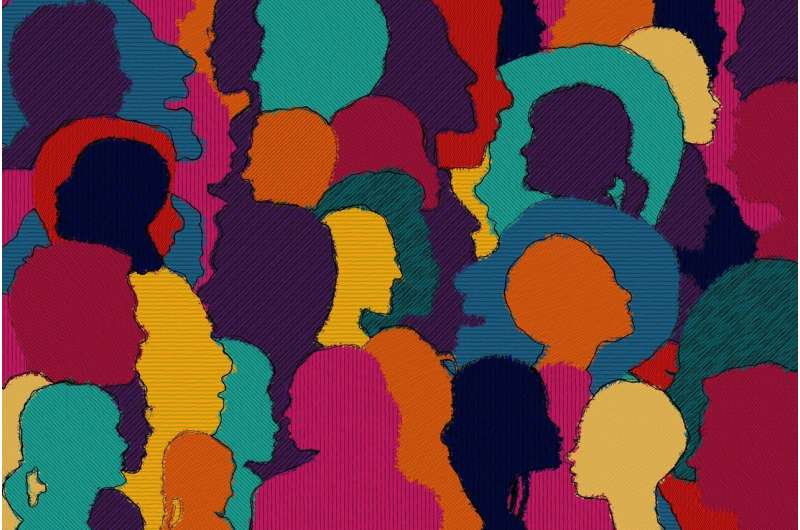This article has been reviewed according to Science X's editorial process and policies. Editors have highlighted the following attributes while ensuring the content's credibility:
fact-checked
peer-reviewed publication
trusted source
proofread
Study: Virtual labs in psychology research boost diversity

University of Oregon psychologists are breaking down barriers to include underrepresented populations in research by bringing laboratories online.
The researchers are trying to address a longstanding issue in psychology studies, which often rely on undergraduate students to volunteer as research subjects. But that can skew results in studies based on younger, more homogenous participants.
A large gap now exists in the diversity of people and communities recruited into social psychology studies, said Bradley Hughes, a UO doctoral alumnus in psychology and a courtesy research associate. Because college students are the easiest for university labs to recruit, most studies on social interactions and impressions are based on their reactions.
While the study of undergraduates has given psychologists important insights into how impressions form, the findings may not be generalizable to other groups or the broader population, he said.
"In a past study, we had pairs of students interacting and one student recognized the other because they lived in the same dorm hall," said Hughes, now a postdoctoral fellow at the University of Toronto.
"So, they were community members. But that isn't necessarily representative of what happens in our day-to-day lives when we are in line at a coffee shop or chatting with somebody over apples at the grocery store. These impressions are formed between people with very different backgrounds and could be much different."
Traditional methods of data collection exclude those who are not readily available on college campuses, so Hughes is bringing labs to where the people are. Hughes and his colleague Sanjay Srivastava, a UO professor emerit of psychology, have developed a way to use video chatrooms to investigate social interactions and the impressions they form, expanding research into the online world to study a more diverse range of individuals.
They introduced their new approach, called the Computer-Mediated Online Round Robin, in a paper published April 29 in the journal Social Psychological and Personality Science.
A concern with online interactions, however, is that social cues may be harder to express or perceive than in face-to-face interactions. You might only see what someone looks like above the shoulders, for example, potentially missing cues displayed in their hands or legs. Or people might behave differently, like inspecting how they look on camera. Those differences could change the impressions we form of another's characteristics and attributes, Hughes said.
"That's the big question behind this paper: Are there important differences for impression formation in communicating virtually versus in-person?" Hughes said. "Is there enough information available to form accurate impressions on someone's personality, like how sociable or trustworthy they are, in a video chat?"
To assess whether impressions formed online differ from those in face-to-face settings, the researchers compared a virtual study using their new approach to in-person ones.
In video chat sessions, participants were in groups of six. Everyone responded to a survey about their own personality traits, rating themselves on scales of extraversion, agreeableness, conscientiousness, neuroticism and openness. Those attributes are known as the "big five" by psychologists.
Participants were then paired up in virtual rooms and asked each other questions like "What do you do on a typical Friday night?" and "How do you stay organized for school or work?" After five minutes of interacting, the participants rated the personality traits of their partner before meeting another individual and then rating them, repeating the process with each member of the group.
In comparing the in-person and online studies, they first checked for differences in accuracy, testing if the association between how people view their own personality traits and what others perceived was the same for each. They also looked at whether participants agree about their personality ratings for an individual. If online interactions limited or distorted social cues, then people might agree less about an individual's personality traits, Hughes said.
The results of the online study were similar to the in-person ones, Hughes said. So, for personality impressions, the choice to videoconference instead of meeting face-to-face might not be as drastic as people think.
"Videoconferencing is a type of interaction that can feel different from in-person, but our work suggests that the differences do not strongly influence how people perceive others," he said.
As more diverse groups and individuals begin to participate in online psychology studies, researchers can also start answering new questions. Hughes is particularly curious how socioeconomic status or political ideology influence people's impressions of others.
Hughes also noted that the study couldn't have happened without the work of students.
"I want to emphasize that this work was made possible by the outstanding undergraduate research assistants at the University of Oregon," Hughes said, noting that more than 45 undergraduates took part. "This couldn't have been done without them."
More information: Bradley T. Hughes et al, The Computer-Mediated Online Round Robin (CMORR): An Online Method for Studying Impressions and Social Interactions, Social Psychological and Personality Science (2024). DOI: 10.1177/19485506241247871
Journal information: Social Psychological and Personality Science
Provided by University of Oregon





















